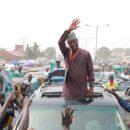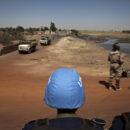Violence in the Eastern Congo: Rwanda fights to maintain economic control of the region – By Herman J. “Hank” Cohen

An army mutiny that began in the eastern DRC last April has now become extremely serious with the creation of thousands of refugees and much controversy over who is behind the continued violence. A United Nations panel of experts has accused the Government of Rwanda of supporting mutinous Congolese army units with arms, money, training and new recruits. The government of Rwanda has vehemently denied the charges. The United States Government has sent a hostile signal to Rwanda by canceling a small military assistance program. US-Rwanda relations are cooling.
To put the current conflict into perspective, it is important to note that what happens in the eastern Congolese provinces of North and South Kivu is of vital importance to Rwanda’s economic and political security. The 1994 genocide that resulted in the deaths of as many as 800,000 Rwandan Tutsis, the country’s minority ethnic group, tied the security of the eastern Congo and Rwanda inexorably together.
The 1994 genocide ended when the Rwanda Patriotic Army, a group of exiled Tutsi invaders from Uganda, defeated the Rwandan military. Over a million Hutu civilians ran away across the border into refugee camps in Kivu. The ecaping perpetrators of genocide went into the refugee camps as well, and began plotting to regain power in Rwanda through guerrilla warfare.
In 1996, the Rwandan army crossed the border into Kivu and broke up the Hutu refugee camps. Most of the refugees returned to Rwanda. Approximately 100,000 ran westward more deeply into the Congo, along with the genocidal perpetrators. The Rwandan army pursued them, and captured most of them near the major city of Kisangani at the headwaters of the Congo River. These civilians, men, women and children, were murdered because their refusal to return to Rwanda apparently made them accomplices to genocide.
In addition to perpetrating this second genocide in the Great Lakes region in a matter of two years, the Rwandan army also created a surrogate army of Congolese dissidents, and supported them in a campaign to capture the capital city of Kinshasa, driving the sitting president, Mobutu Sese Seku, into exile, and installing a new head of state, Laurent-Desirée Kabila, a long time Congolese dissident in exile.
Between their first armed entry into Kivu in 1996, and their formal departure in 2002, after six years of multinational military conflict, the Rwandan army controlled eastern DRC under military occupation. It is not hard to imagine that during those six years, the Rwandan government developed very strong economic, political and security ties to the two Kivu provinces. Indeed, even after the formal departure of Rwandan forces in 2002, local Congolese militias, and some Congolese army units, remained under Rwandan influence and control.
North and South Kivu are rich in mineral resources, some of which are vital to telecommunications, and are imported in massive quantities by American and European equipment makers. During their military control of the Kivus, the Rwandans established strong commercial links with the mineral producers. These links developed to such an extent that a substantial percentage of Rwanda’s gross domestic product comes from the non-legal mineral trade originating in the eastern Congo.
At present, the government of the Democratic Republic of the Congo, after the completion of its 2011 election, is trying to regain control of its own territory and natural resources. Several units of the Congolese army, stationed in the Kivu provinces, have effectively been under the control and influence of the Rwandan government. These units have been protecting Rwanda’s commercial supply lines that deliver the valuable minerals. The Congolese Government wants to retake control of these units, and either disarm them, or transfer them to other regions of this vast country. The economic stakes are too high for Rwanda, and it is virtually impossible for Rwanda to acquiesce in this attempted reversal of the military balance in the eastern Congo.
The current fighting may however be the end of the line for Rwanda’s illegitimate exploitation of the eastern Congo’s mineral resources. The fact that the UN peacekeeping mission in the Congo (MONUSCO) is fighting on the side of the official army is an indication that the international community has had enough. Rwanda may consequently be entering a period of difficulty.
Herman J. “Hank” Cohen served as the United States Assistant Secretary of State for African Affairs from 1989 to 1993.







Isn’t mr Cohen who said one day that Mobutuists will never come back in power in the Drc????isn’t mr Kengo wa Dondo the president of the senate ,thus the nr 2 in line int he Drc according to the constitution?
Please ,mr Cohen we have enough of your lessons on the Drc matters over the years.
Best ryes
Mr Cohen has a point here but i strongly believe that Rwanda is not the only foreign power fighting to keep a hand on the congo’s resources, the Usa and Europe are with them.
One thing I know though is that these congolese people are been preparing themselves and it will take the needed time but evantually they’ll come out and bang! A big pay-back for Rwanda, my luck! Worse than the 1994. Sorry for my ugly truth…
In did, this looks to be the end of Rwanda’s illegal enrichment.
For DR Congo, the new chapter begins with all our friends on our side now.
The body language of Kagame in media interview explain it all.
God, the nature and the time will always be on DR Congo side, because they are the humble people on earth.
Cohen should explain more about those American and European makers who are importing massive quantities of mineral resources from rebels! Are they also backing the so called rebels? Any sanction? Cohen didn’t say anything about the role of Western Countries in that mess!!!
The period of ‘difficulty’ for Rwanda was during 1994 genocide! Can we expect something worse than that? Never again…
JM